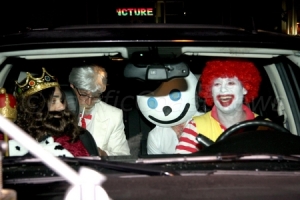Last week saw the news that Austrian Niko Alm successfully won the right to be pictured in a pasta strainer in his driving licence photo. He claimed, however facetiously, that wearing the headgear is a requirement of his religion, Pastafarianism. This is a parody religion (although it goes to great lengths to claim it is sincere), originating from an audacious letter sent to the Kansas State Board of Education by physics graduate Bobby Henderson. Henderson sent the letter when Kansas was considering changing how science was taught in schools to include the severe questioning of evolution in favour of promotion of the ‘intelligent design’ theory. This is the theological doctrine that certain things are most appropriately explicable with reference to an intelligent, supernatural cause, namely God.
Henderson was one of many angered by this enforced marriage in schools of science and religion. He thus wrote this brilliant, facetiously knowing letter to the Kansas School Board, requesting that they also teach in schools the idea that the ‘Flying Spaghetti Monster’ created the world, because this idea is supposedly as much rooted in science as intelligent design. Due to the argument’s prescience and humour, it has become a cult phenomenon, as testified by Niko Alm’s satirical antics.
TAY seeks out some more whose religious/’religious’ beliefs are driving them to the brink of cultural acceptability. Heroes of libertarianism, raving lunatics or both? You decide…
Ned T. Rave
On the face of it, Ned Rave is just like any other 25-year-old British man. He works in the accounts department of a fairly successful telecoms company, lives with his girlfriend in moderate rented accommodation in Leicester and at the weekend plays Sunday League football, often hindered by the night before’s antics. Beneath this though lies a very particular practice, one which arguably marks him out as, quite literally, a raving lunatic. For, five times a day, without fail, Ned stops whatever he is doing at the time and performs his own act of worship to ‘Dave’ – The God of D‘n’B/House music.
Ned reasons for it as such: “When I first heard ‘God is a DJ’ by Faithless, it just, you know, spoke to me. I just thought it made so much sense…that there is some sort of supernatural being out there, working through all the disciples like Rollo (of faithless), Tiësto, Judge Jules, and now Skream, Benga, Skrillex, Pendulum and so on to make all these banging tunes which unite everyone in like….love, you know. Look, you hardly ever see anyone arguing, getting violent, starting wars or anything when they’re there, in the moment listening to that drop on ‘In for the Kill’ (Skream’s remix) or that bassline on ‘Slam’ (Pendulum) . It’s all just, good, man, so there’s gotta (sic) be someone behind that ain’t there. I call him ‘Dave’ cos I think he’s just a regular, stand-up geezer, just really powerful ‘n’ that.”
So it is, because of this epiphany, every day, before sunrise, at noon, in the afternoon, after sunset and after nightfall, Ned will leave what he is doing (unless he is clubbing to D ‘n’ B anyway) to worship ‘Dave’. He does this by taking an mp3 or preferably his “baby” – the boombox – to one of the many ‘churches’ in Leicester (‘clubs’, to you and me) or, where possible, the site of the former Virgin Megastores where he bought that fateful Faithless song on CD. He then faces in the direction of his spiritual home, Ibiza, and has “a good ol’ rave up”. Australian D’n’B merchants Pendulum even recently paid tribute to Ned in one of their videos.
Ned’s unusual lifestyle receives a generally confused but accepting reception among colleagues, loved ones, friends and family. His bosses at work are not overly enamoured by the regular breaks from work, but put up with them for Ned’s general productivity. One colleague seemingly only semi-jokingly accounted for his behaviour by claiming: “well, it’s the lengths working in accounts takes you too…half the time I feel like joining him, to be honest”. Alike Ned’s bosses, Ned’s girlfriend isn’t a huge fan, but grudgingly accepts his behaviour: “it can be annoying, especially after we’ve…you know and he has to go outside and ‘worship’. But what do you do… I love him and if you’d take it away from him, he’d probably be worse for it.”. His best mate Tom is a little more enthusiastic: “fair play to him; he’s a great lad, living life how he wants. Yeh, he’s taken it a bit far but everyone loves a bit of Drum ‘n’ Bass don’t they”.
Joanna Berger
19-and-half stone Joanna Berger loves her fast food. Well, that’s a bit of an understatement; she lives, and tragically will probably die, by fast food. Her worship of the “holy trinity” of Colonel Saunders, Ronald McDonald and The King (of Burger King) is such that she eats under the very strictest dietary restrictions. Where possible, food must be fried in the “golden oil” of the “sacred deep fat fryer”. If this is not possible, food can be fried, grilled or cooked in the oven, but under no circumstances must be any “messin’ and mixin’” of the food before this happens, lest the food is “impurified”. For Ms Berger, the most unforgivable culinary sin is eating “that horrible rabbit food” because it is “very unclean and an attack on the…”. At this Joanna pauses for thought and to stuff another mouthful chips into her sizable gullet, but her friend finishes her sentence: “wondrous bounty of the holy trinity?”. “Yeh, that’s the one” Joanna concurs, in the process fully revealing an unedifying cornucopia of beige in her mouth; fat, oil and even some potato. Friends and family are severely concerned and worried by Joanna’s strange gastronomic habits. One has even turned to dealing with the situation with a dark humour, such has been the futility of his attempts to reform Joanna: “For around 10 years, I don’t think she has eaten any ‘meat’ containing more than 20% real meat and which has not in its production been responsible for the destruction of a part of the Amazon rainforest”.
Ben Waiting
If you didn’t know any better, you would probably label 28-year-old Londoner Ben Waiting as just your typical ‘geek’. This is due to his portly frame, unkempt hair, face marked by glasses and spots and slightly awkward demeanour. He also displays the all the hallmarks of a typical ‘geek’; lives at home with his mum, does a bit of freelance programming and, of course, plays computer games for inordinate amounts of time. What sets Ben apart though is that he finds hard to divorce the virtual from the real. Games and, to a lesser extent, films greatly influence his real world views. For instance, due to his love of James Bond, he thinks that the Soviet Bloc is full of shadowy, facially-disfigured and oddly-monikered oil magnates with grand, nefarious plans to take over the world. Many also consider to him to live very vicariously through his World of Warcraft character, Ben the Great. Most notably by forming ‘relationships’ with the other ‘WoWers’ (or perhaps, rather, their avatars). These sincere beliefs and behaviours can be seen as worrying, although his small group of friends regard them as mere harmless quirks, only a little more extreme than their mannerisms and thought influenced by gaming and cyberspace.
What is the cause of grave concern though is Ben’s behaviour stemming from his recent prediction of a zombie apocalypse on Friday the 13th of January 2012. He came to this apocalyptic ‘realisation’ after “careful examination of the classics: 28 Days Later, Resident Evil, Return to Castle Wolfenstein, Doom and the newest Red Dead Redemption game, Undead Nightmare”. He studied subtexts, decoded hidden messages and cross-referenced “prophecies of the zombie apocalypse” from these zombie-based shooting games. The final piece in Ben’s apocalyptic jigsaw is the fact that the end of the 5,125-year-long cycle in the ancient Mesoamerican Long Count calendar (used notably by the Mayans) is 2012; a fact believed by many to herald the end of the world.
This ‘realisation’ (Ben believes ‘prediction’ is an insult to the – supposed – certainty) has caused Ben to become increasingly isolated and nihilistic, claiming everyday life no long matters in the grand scheme of things. He has already made a survival kit containing 2,400-calorie food bars, solar blankets, water pouches, flashlight, tent, batteries, first aid kit, purification tablets, Swiss army knife, flares, camper’s stove, whistle, gloves and waterproof matches. Much to his mother’s chagrin, he has also set about building an Anderson shelter in the garden, redirecting the power supply to it and stocking it with basic furniture, several BB guns, canned food and, of course, his beloved £2,000 Vortex 2000 PC. He has even acquired a powerful chainsaw for the supposed zombie attack, and applied to the relevant powers-that-be to be granted a license for shotguns. At time of writing, however, the authorities remain unconvinced by Ben’s prophecy.
As hinted, Ben’s mother is becoming distressed by his behaviour. At the threat of throwing him out, Ben finally caved in to her continual requests to see a psychotherapist. The psychotherapist concluded that Ben had a rare psychiatric condition called ‘Delusional Disorder’. This is a condition where one suffers delusions (fixed, adamant beliefs that run contrary to clear consensual evidence), but without necessarily any clear mental hiccups. This can be seen in Leonardo Di Caprio’s character in Shutter Island and is also the case with Ben as both seem to function fairly well. A friend/cyber acquaintance of Ben claimed that he has “tried repeatedly to explain to Ben the Great, with my unparalleled knowledge of zombie games, that his prediction is in fact erroneous, but he has none of it. It is no madder than many religious prophecies which have been believed by millions though…”
Joel Durston








